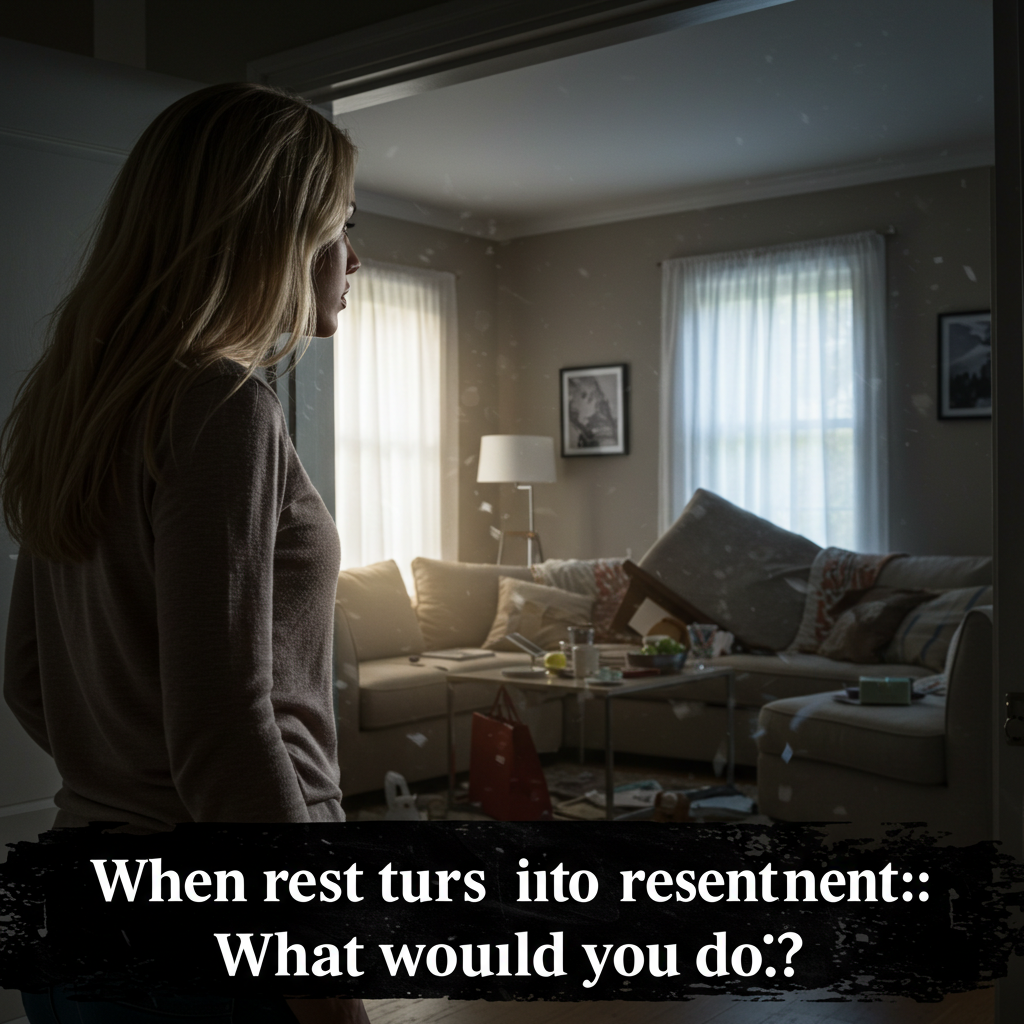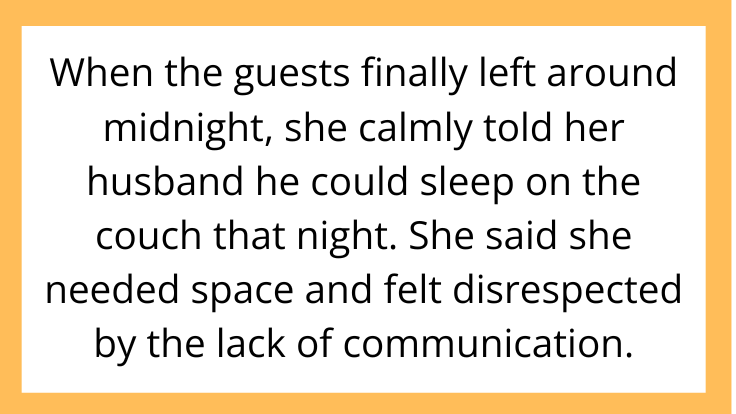AITAH for Telling My Husband to Sleep on the Couch After He Invited His Friends Over Without Asking Me?
Marriage is all about partnership—but what happens when one partner makes decisions like they live alone? In today’s AITAH-inspired blog post, we dive into a story that sparked fierce debate: Is a woman wrong for kicking her husband out of their bed after he brought guests home without her consent?
Let’s unpack the situation, explore both sides, and see where the internet landed.
The Situation: A Surprise Gathering Turns Into a Showdown

Our poster—let’s call her Zara—is a 28-year-old woman who works full-time and recently started an online degree program. Her schedule is packed, and when she comes home, she craves peace and quiet.
One Friday evening, after a brutal 10-hour shift, she walked into her apartment to find her husband and four of his friends lounging in the living room. Beer bottles were out, loud music was playing, and the TV was blaring a sports game.
The problem? He never told her they were coming.
Zara was blindsided. She hadn’t eaten, hadn’t showered, and hadn’t mentally prepared to entertain guests. She gave her husband a tight smile, went into their bedroom, and stayed there all evening.
When the guests finally left around midnight, she calmly told her husband he could sleep on the couch that night. She said she needed space and felt disrespected by the lack of communication.
He was stunned—and angry.
The Conflict: Disrespect or Overreaction?

Zara’s husband argued that it wasn’t a big deal. “They were just hanging out for a few hours,” he said. “I didn’t think I needed to ask permission to have my friends over in my own home.”
Zara disagreed. She felt like a stranger in her own space, blindsided by noise and chaos when all she wanted was rest. She believed that being married means discussing decisions that affect both partners—especially when it comes to shared space and comfort.
The next morning, her husband was still upset. He called her “dramatic” and “punishing” for making him sleep on the couch over what he saw as a minor issue.
Zara posted on Reddit asking: AITAH for kicking my husband out of the bed because he didn’t tell me about his friends coming over?
Reddit Reacts: Communication Is Key

Reddit users were quick to respond, and most sided with Zara.
“Your home is supposed to be your safe place,” one commenter wrote. “You’re not mad that he had friends over—you’re mad that he didn’t include you in the decision.”
Another added, “He made a unilateral decision in a shared space. You responded by setting a boundary. That’s fair.”
A few dissenting voices suggested that the couch punishment might have been a bit much and that open communication—rather than immediate consequences—might’ve led to a healthier outcome.
Still, most agreed: lack of communication in a shared home is a recipe for resentment.
Why This Hits a Nerve: Shared Space, Shared Decisions

This isn’t just about beer and a few buddies—it’s about respect.
In relationships, especially marriages, shared space is sacred. When one partner disregards the other’s needs or routines, it can feel like erasure. And while no one wants to live under rigid rules, mutual consideration isn’t a rule—it’s a requirement.
Zara wasn’t angry because her husband had friends. She was hurt that she wasn’t even considered.
Could This Have Been Handled Differently?

Absolutely. Let’s explore how both parties could’ve approached things better:
For Zara:
-
Instead of kicking him out of the bed immediately, she could’ve waited until morning to express how she felt, opening the door for a calm conversation.
-
Expressing her need for advance notice next time could’ve laid the groundwork for a boundary without escalation.
For Her Husband:
-
A quick text—“Hey, the guys are coming over tonight. Just a heads-up”—would’ve shown basic respect.
-
Apologizing instead of doubling down could’ve diffused the situation and shown that he cared about her comfort too.
A Deeper Issue? Emotional Labor and Consideration

Many commenters pointed out that this story reflects a deeper imbalance often seen in relationships: emotional labor.
Zara is managing work, education, and the emotional load of running a household. Her husband, knowingly or not, dismissed her need for downtime. This isn’t just about guests—it’s about priorities and mutual respect.
When one partner continually “forgets” or “doesn’t think” to check in, it sends a message: Your comfort is secondary to my convenience.
The Verdict: Not the Villain, But Communication Matters

Was Zara the villain for asking her husband to sleep on the couch? Most would say no.
She was tired, blindsided, and needed a reset. She didn’t yell, didn’t make a scene—she set a boundary in the only space she had control over: her bedroom.
But if this pattern continues—on either side—resentment could grow. The takeaway here? Set boundaries, but also set the tone for open communication.



